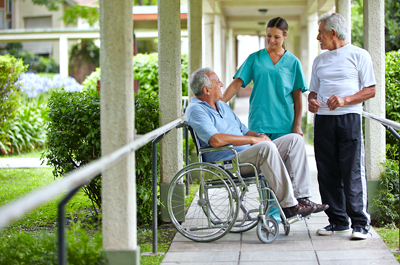Dementia Patients Tapering Antipsychotics May Benefit From Social Interaction and Exercise
Abstract
Providing personalized social activities to patients coming off antipsychotics is associated with lower mortality rates and neuropsychiatric problems.
There is mounting evidence that the use of antipsychotics to treat people with dementia for psychiatric symptoms should be limited, given the medications’ modest benefits and potential risks including increased memory loss, stroke, and even death. As such, there has been an effort in nursing homes to review antipsychotic prescriptions more rigorously to limit the patients receiving them and the duration of treatment.

Personalized social and/or physical activities can help mitigate the neuropsychiatric problems that arise when elderly patients with dementia are taken off antipsychotics.
However, simply weaning people with dementia off antipsychotics may not be in their best interests, as a study published November 20 in AJP in in Advance has found.
In fact, unless a nonpharmacological intervention is implemented as antipsychotics are reduced, such changes may lead to worse neuropsychiatric outcomes, according to an analysis of a real-world intervention strategy in nursing homes throughout the United Kingdom.
As part of a multifactorial assessment of different aspects of care, staff in 16 nursing homes were randomly assigned to administer some combination of antipsychotic review (routine and rigorous assessments of medication use in each patient and discontinuation if warranted), personalized social interaction, or personalized physical activity over the course of nine months.
As a control, two centers did not have any of these three components, though staff in all 16 were trained to administer the basic aspects of person-centered care—which encourages staff to consider all patient preferences, needs, and values when providing them with care.
Half of the patients taking antipsychotics in nursing homes that implemented antipsychotic review were taken off during the study period, while no patients stopped medication in the other nursing homes.
Mortality rates in the nursing homes implementing antipsychotic review were lower than those in nursing homes without antipsychotic review (28 percent and 35 percent of residents, respectively, died over the course of the study period).
But while antipsychotic review had this modest effect on mortality—which is the main reason guidelines urge less usage—the patients who stopped taking antipsychotics experienced worse overall neuropsychiatric outcomes (according to neuropsychiatric inventory scores) than patients who stayed on the medications—highlighting the long-term challenges associated with halting antipsychotic use.
Social engagement may be a counterbalance, stated lead study author Clive Ballard, M.D., a professor of age-related diseases at King’s College London. “Incorporating a social interaction program tailored to a person’s interests not only mitigated some of the psychiatric symptoms that re-emerge once antipsychotics are stopped, but it further reduced patient mortality.”
The mortality rate was only 19 percent in the nursing homes that implemented both antipsychotic review and social engagement.
Interestingly, patients without any antipsychotic review who received personalized social activities had slightly worse neuropsychiatric symptoms than those who did not, indicating social interaction may be effective only as a complement to antipsychotic withdrawal. Ballard believes the positive effects of social interaction along with antipsychotic review occur because staff can provide more tailored social activities to match the psychiatric symptoms that emerge after antipsychotic discontinuation.
Nine months of physical activity also improved neuropsychiatric symptoms in people with dementia, though it did not provide any boost specifically to depression by itself, a finding which the authors noted is contrary to some previously published work. However, as with the additive effects seen with social interaction, exercise did reduce symptoms of depression in patients who received antipsychotic review.
Ballard stressed that while these interventions were patient centered, they were also non-intensive, involving just an hour of activity every week—potentially making their implementation feasible in most nursing home settings.
This study was part of the United Kingdom’s Well-Being and Health for People With Dementia program and was supported by the National Institute for Health Research. ■



